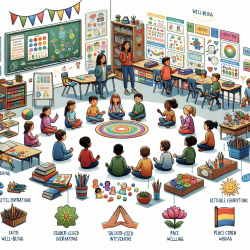Introduction
Social and Emotional Learning (SEL) is increasingly recognized as a critical component of education that promotes the overall well-being of children. The recent study, "Building elementary students’ social and emotional skills: A randomized control trial to evaluate a teacher-led intervention," explores the impact of a teacher-led SEL intervention in elementary schools. This blog delves into the study's findings and offers insights for educators aiming to enhance their SEL practices.
The Importance of SEL
SEL encompasses the development of skills necessary for understanding and managing emotions, setting and achieving goals, maintaining positive relationships, and making responsible decisions. Evidence-based SEL programs have been linked to numerous positive outcomes, including improved academic performance, reduced aggression, and enhanced well-being.
The Study: Faith and Wellness Resource
The study evaluated the "Faith and Wellness: A Daily Mental Health Resource," a teacher-led SEL intervention designed for elementary students in Ontario, Canada. This resource aims to be brief, accessible, and cost-effective, addressing common challenges faced by existing SEL interventions, such as lack of time, training, and resources.
Key Findings
- Teachers who implemented the Faith and Wellness Resource reported increased confidence in teaching SEL and more frequent SEL instruction.
- Positive changes were observed in teachers' perceptions of classroom climate and student engagement.
- Although student outcomes were less robust, there was evidence of dosage effects, indicating that frequent implementation led to better student outcomes.
Implications for Educators
For educators seeking to enhance their SEL practices, the study highlights the importance of regular and frequent SEL instruction. Teachers play a crucial role in modeling SEL and fostering a positive classroom environment. The Faith and Wellness Resource provides a practical, no-cost tool for integrating SEL into daily classroom activities without requiring extensive training.
Encouragement for Further Research
While the study offers promising results, further research is needed to explore the long-term impacts of teacher-led SEL interventions. Educators are encouraged to engage with ongoing research and share their experiences to contribute to the growing body of knowledge on effective SEL practices.
Conclusion
The Faith and Wellness Resource demonstrates the potential for teacher-led SEL interventions to enhance classroom environments and support student well-being. By prioritizing SEL, educators can play a pivotal role in fostering the social and emotional development of their students.
To read the original research paper, please follow this link: Building elementary students’ social and emotional skills: A randomized control trial to evaluate a teacher-led intervention.










